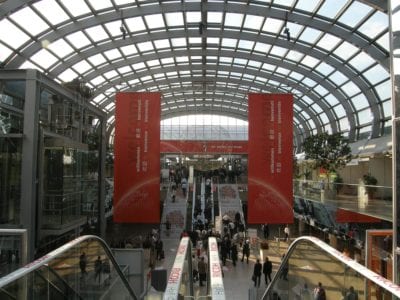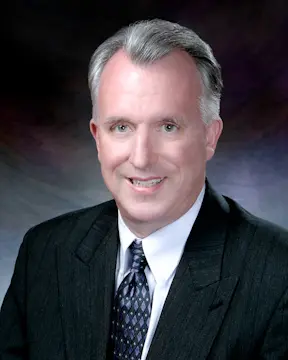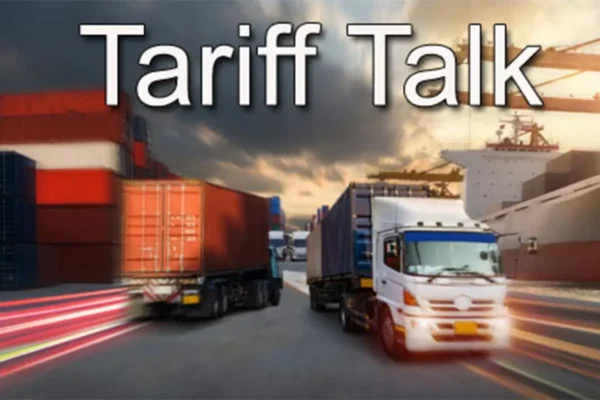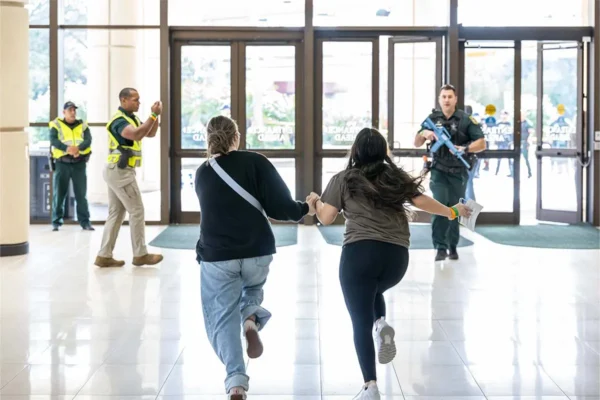
The Messe Düsseldorf Group maintained its robust position in 2017 as one of the most profitable European trade fair companies with its own premises (pictured right). After a record year in 2016 with the two number one events, drupa and K, the Group followed the usual cycle, with a decline in sales to EUR 360 million (previous year: EUR 443 million). Messe Düsseldorf GmbH’s target was exceeded by around 9 percent, so that the total GmbH revenue was EUR 330 million (previous year: EUR 407 million). Of this figure around EUR 35 million was generated internationally (previous year: EUR 32 million). The annual GmbH result after tax will be around EUR 30 million (previous year: EUR 71 million). A one-off special effect of EUR 4.5 million results from the sale of shares in the Igedo Company. Plans for the 2017 financial year include paying out dividends. The final amount will be decided by the committees in the second quarter of 2018 when the year-end results are finalized. All figures are subject to final accounts.
Explaining the general direction of the Group, Werner M. Dornscheidt, president and CEO of Messe Düsseldorf GmbH, said, “We are aiming to increase our sales without the usual cyclical fluctuations that normally occur in the trade fair business. Thanks to the unwavering strategic development of our global portfolio under the umbrella of Düsseldorf’s leading global trade fairs, we’ve increased the international share of our net revenue from 16.5 percent in 2016 to around 17.8 percent. We will definitely pursue this path in our global network–with new events, innovative ideas and local joint ventures. We want to increase our Group’s international sales to 25 percent by 2030. This is still very much our goal.”
Messe Düsseldorf 2030: Strategic expansion of the global portfolio focuses on future markets
Of the EUR 64 million achieved by the Group internationally in 2017, EUR 31.4 million was generated in Russia, EUR 11.7 million in China, EUR 7.8 million in Singapore and EUR 4.3 million in the U.S. In total, the Messe Düsseldorf Group organized 54 own and joint events outside Germany; 66 events are planned for 2018. In particular, Messe Düsseldorf has been strengthening its position on future markets with major potential for growth, such as Iran and India. Of the nine new events held outside Germany in 2017 all except one took place in either Tehran or New Delhi. Others will follow in 2018. “We are taking the topics of our leading global trade fairs into new markets. This way we are creating cross-border synergies. We regard a global presence as an indispensable investment on our part, both for our customers’ benefit–seeing that they operate worldwide–and also to strengthen the number one events at our home base in Düsseldorf,” stated Dornscheidt.
Positive feedback effects: leading global trade fairs in Düsseldorf ensure guaranteed revenue through a high level of internationality
The positive feedback effects of Messe Düsseldorf’s international business are substantial for Düsseldorf as a trade fair venue. Averaging an international exhibitors’ share of 71.5 percent, own events in Düsseldorf in 2017 show values again which are unique for German industrial goods trade fairs (previous events: 70.6 percent). The high level of internationality was particularly in evidence at ProWein (85 percent), MEDICA (79 percent) and interpack (77 percent).The proportion of international visitors rose to an average of 36.7 percent (previous events: 35 percent). The highest rates were achieved by interpack with 74 percent as well as EuroShop and MEDICA with over 60 percent international visitors.
Dornscheidt emphasized that “Düsseldorf’s leading global trade fairs are brands with a high level of international prestige. It’s not just us as trade fair organizers who benefit, but the entire Düsseldorf region. After all, guests from other countries stay in Düsseldorf longer than trade visitors from other parts of Germany.” The ifo Institute recently estimated that the revenues generated in and around Düsseldorf by events and conventions organized by Messe Düsseldorf and its subsidiary DCSE amounted to EUR 1.66 billion. The city owes 16,700 jobs and tax revenues of over EUR 36 million to the trade fair and event business. “Düsseldorf’s indirect returns should in fact be rated much higher, considering that Düsseldorf City Council pays no subsidies in return. Messe Düsseldorf has been operating, investing and growing in its own strength for many years,” added Dornscheidt.
In all, Messe Düsseldorf GmbH held 29 events in 2017 (previous year: 31) at its exhibition center, including 17 own and 12 partnership/guest events. 28,700 exhibitors showcased their innovative products to around 1.4 million visitors, occupying nearly 1.2 million square meters of rented net exhibition space. “We recorded about 6 percent more visitors and exhibitors and 12 percent more net space than at the previous events,” said Dornscheidt on the new record figures at the home base. The biggest revenue drivers last year were the number one events: interpack, EuroShop, MEDICA, A+A, boot and ProWein.
The most central task over the next few years will be the digital transformation of the trade fair business
Dornscheidt sees the digital transformation of Messe Düsseldorf as a vital factor in determining its future: “The digitization of industries is changing markets and products–and therefore also trade fairs as meeting points of the globalized economy. When it comes to viable survival strategies, a trade fair company can no longer simply rely on providing technically well-equipped rental space on its premises. Our events must anticipate and understand the new demands of exhibitors and visitors and must open up entirely new areas of experience.” The focus is not only on digital measures in relation to bookings and visitor registrations, but also on new services designed to facilitate the business activities of exhibitors and visitors, to intensify a person’s general experience at trade fairs and to extend the same through the use of suitable media. This includes matchmaking tools, personalized indoor navigation and location-based information systems as well as the development of new business models in data-driven marketing. According to Dornscheidt, an important step in 2017 was the successful launch of the new Online Order System, while the most important hardware investment will be the WLAN-equipment of all halls.
The Group made the important future issue of digitization part of its corporate management and created a designated business unit for the digital transformation of Messe Düsseldorf. Alongside Messe Düsseldorf’s digital transformation, the Group continues to pursue the modernization of the Düsseldorf exhibition center as a central part of its corporate strategy. In 2017 and 2018 the focus was and will be on building a new Hall 1 and southern entrance area with state-of-the-art space for exhibitions, conventions and other events. The investment total of all construction and reconstruction activities in modernizing the exhibition center will be around EUR 650 million until 2030. The robust annual results of 2017 provide a financial basis for this development.
With a revenue of around EUR 360 million in 2017, the Messe Düsseldorf Group maintained its position as one of Germany’s most successful trade fair companies. 28,700 exhibitors presented their products to 1.35 million trade visitors at events in Düsseldorf, Germany this year. In addition, conventions attracted over half a million visitors. About 50 trade fairs were held in Düsseldorf, including 23 number one events in five areas of expertise: machinery, plants and equipment, trade and services, medicine and healthcare, lifestyle and beauty, and also leisure. In addition, there were about 70 own, joint and contracted events outside Germany, demonstrating that the Messe Düsseldorf Group is a leading global platform for export. Messe Düsseldorf GmbH is the trade fair company with the highest level of internationality in capital goods exhibitions. In 2017 Messe Düsseldorf’s own events in machinery, plants and equipment had approximately 74 percent international exhibitors and attracted 73 percent trade visitors from other countries. Overall, Düsseldorf trade fairs were attended by customers from about 180 countries. The Group runs a global network of sales offices in 138 countries (74 international representations) as well as competence centers in eight countries. For info on visiting or exhibiting at any of Messe Düsseldorf’s worldwide trade fairs, contact Messe Düsseldorf North America, 150 N. Michigan Ave., Ste. 2920, Chicago, IL 60601. Telephone: (312) 781-5180; fax: (312) 781-5188; e-mail: info@mdna.com; or visit www.mdna.com































